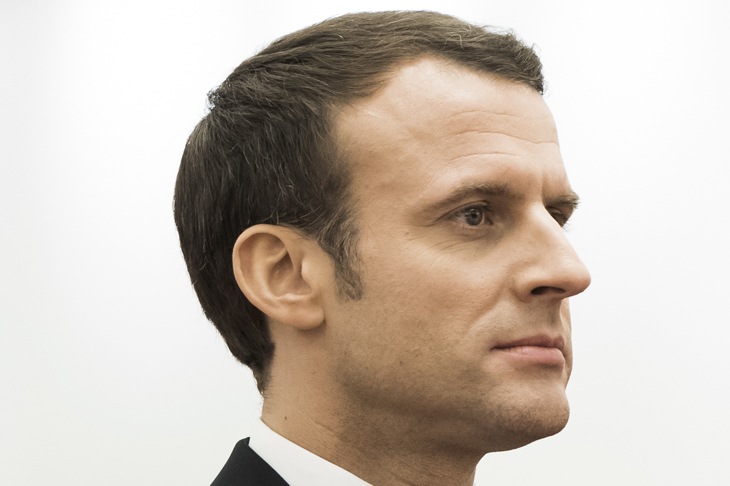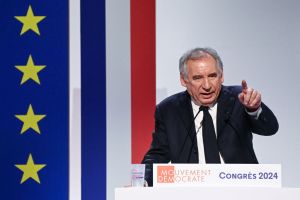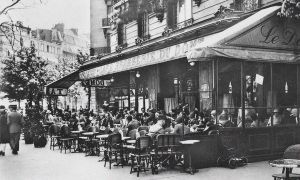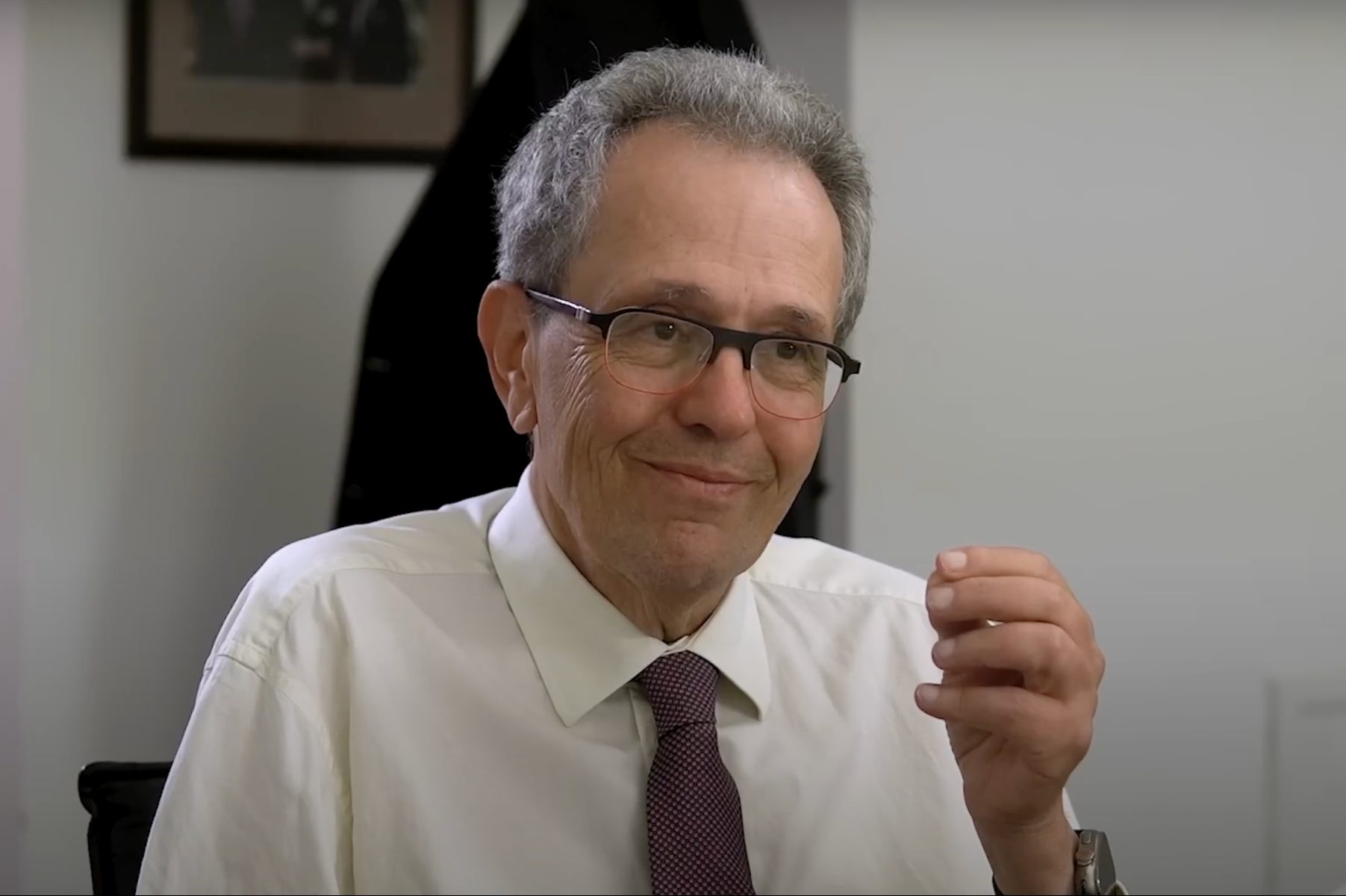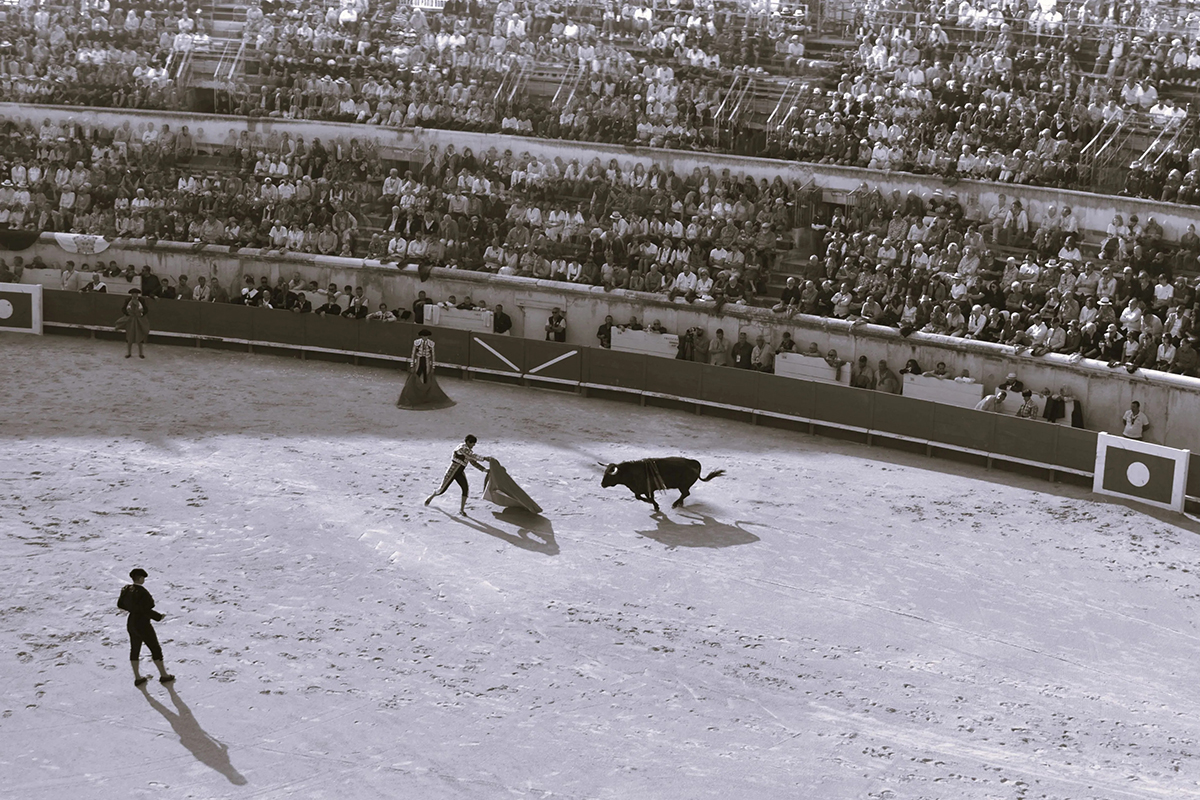The honeymoon is over for Emmanuel Macron. His first 11 months in office have been something of a breeze — defined by economic growth, international approval and museum openings in the Middle East. But France’s youthful President is gearing up for months of domestic hostility. ‘The war of attrition’ was the headline in Tuesday’s Le Parisien. Alongside this stark declaration was a photograph of one of the President’s enemies, a prominent figure in CGT, the hard-left trade union. Burly, bearded and belligerent, Laurent Brun, head of the union’s railway section, vowed intransigence in the three-month rolling railway strike that started this week.
Macron is as determined as the strikers and appears confident that victory will be his. Over the Easter weekend, French television broadcast pictures of the President getting into his car. ‘Don’t give in to the strikers!’ yelled a passer-by. A smiling Macron saluted his supporter with a clenched fist and a cry of ‘Don’t worry!’
As cocky as ever, then. But Macron may be starting to feel nervous. He knows his reputation is on the line, not just in France but across the world. Imagine the smirks in Berlin, the sniggering in London, the disappointed head-shaking in Brussels, if the tough-talking President turns out to be as weak as his predecessors when confronted with mass industrial action.
Since his election, Macron has taken the world by storm. He’s hosted Trump, Putin and Erdogan, eased tensions between Lebanon and Saudi Arabia, taken the initiative in stemming the flow of migrants from North Africa into Italy, repositioned France as the world’s no. 1 soft power, and reinvigorated the Paris Climate Agreement of 2015 after the withdrawal of the US.
All this was achieved against a backdrop of complete dominance on the domestic front. Widespread industrial action last autumn against the first stage of his economic reforms petered out, and his political opponents have been similarly ineffectual, disorientated by their parties’ dismal performance in last year’s election when Macron surged to his remarkable victory.
But now the President faces a quartet of challenges that will shape the next four years of his presidency. The return of Islamist terror to France has shaken the country, demonstrating that not even a quiet backwater is safe from the jihadists. Last month’s attack in Carcassonne and Trèbes that left four dead was also proof of what the intelligence services have been warning for months: that the fall of the Isis caliphate won’t bring an end to the violence in Europe. The opposite, in fact, with scores of jihadists slipping back determined to carry on the fight.
Intertwined in many French minds with Islamism is immigration — the second hurdle for Macron — and the belief that lax border controls have allowed terrorists to cross with ease into their country. In February, his government unveiled plans to crack down on illegal immigration and hasten the expulsion of failed asylum seekers. The proposed bill, which will be tabled in parliament this month, is welcomed by the majority of the public but not by some in his own party, La République En Marche. The bill will be passed, but there’s already been strike action at France’s refugee protection office, and anti-capitalist groups plan to demonstrate against it this weekend. It has also upset some of the artistic community, with Jean-Marie Gustave Le Clézio, winner of the 2008 Nobel Prize in Literature, railing against France’s ‘scandalous’ treatment of migrants.
Hand-wringing writers won’t worry Macron but the third problem, the railway workers who’ll be striking for two out of every five days until the end of June, is more formidable. Among the reforms the government intends to introduce is one that will open up rail transport to foreign competition, and improve a service that’s declined markedly in recent years. On top of that is the €46.6 billion debt accrued by SNCF, an astronomical figure which will be partly reduced by ending the privileged status of railway workers that’s existed since 1909, and now includes a guaranteed job for life and retirement at as early as 50 for drivers and 57 for other employees.
Supported by the CGT, the railwaymen are determined to retain their entitlements, but Macron regards the SNCF as the embodiment of outdated public-sector working practices. ‘We live in a changing world,’ said transport minister Elisabeth Borne at the weekend. ‘The SNCF needs to change too in order to offer better services.’ One newspaper poll this week revealed that of nearly 100,000 respondents, only 28 per cent approved of the strike. But that was in the centre-right Le Figaro. Many on the left are supportive; and other groups with grievances such as students, Air France employees, supermarket workers and refuse collectors will launch their own strikes or protest action in the near future.
The fourth challenge facing Macron appears on the surface to be the least problematic: what to do about the 300 environmental campaigners occupying 1,650 hectares of wetlands in Notre-Dame-des-Landes, near Nantes? In January they won their battle to prevent the construction of an airport after a lengthy campaign, and in conceding defeat the government instructed them to evacuate the area by 31 March. The deadline has passed and a hardcore remain, a rag-tag bunch of protesters entrenched in defensive positions that include tunnels and booby-trapped barricades. The police could crush their resistance in hours but the government knows that could provide the spark for something much bigger. The Zadistes, as they call themselves — from Zone à Défendre, or ZAD — are a symbol of defiance for France’s professional protesters, the anarchists, environmentalists and antifas who are itching for a fight with their president.
What France has embarked upon therefore is not just a war of attrition; it’s a war of vision. Macron and his supporters are desperate to shake off France’s reputation as a nation of work-shy strikers, the people the President memorably described last September as fainéants (slackers). It was no coincidence that on the day the SNCF strike started, the government announced record foreign investment in France in 2017, a 16 per cent increase on the previous year. The left-wing newspaper Le Monde attributed this statistic to ‘the Macron effect’ .
This is the France Macron envisages, the ‘start-up nation’ that he described last year during his presidential campaign and that he hopes will attract the world’s brightest minds. He wants to reposition Paris as a post-Brexit bankers’ paradise and has announced he will spend €1.5 billion in the next five years as part of a new national strategy for artificial intelligence to rival that of China and the US.
It’s a vision that horrifies millions of men and women who don’t want France to change, who cherish the security and protection of the public sector. But Macron isn’t for turning. He’s even angered the elderly by increasing taxes on pensions to raise money to pay for cuts for workers. ‘Some people will complain and don’t want to understand, but that’s France,’ he has said.
Many of the pensioners would have been among the eight million workers who 50 years ago, in May 1968, took to the streets in a general strike to protest against the rule of Charles de Gaulle, a president they saw as out-of-touch and conservative. Half a century later, the man in the Elysée Palace is regarded as too innovative and ambitious, a dangerous young megalomaniac who in the words of one Socialist MP is adopting ‘the politics of Margaret Thatcher’. And if Emmanuel Macron emerges with his reputation intact after this spring and summer, he’ll be entitled to call himself the Iron Man.



